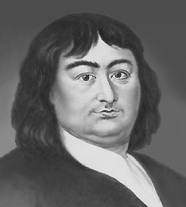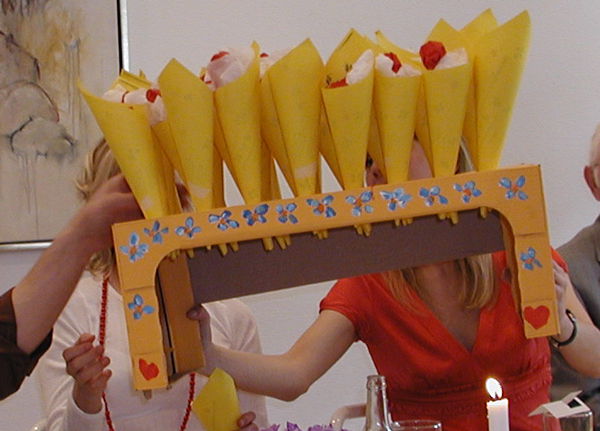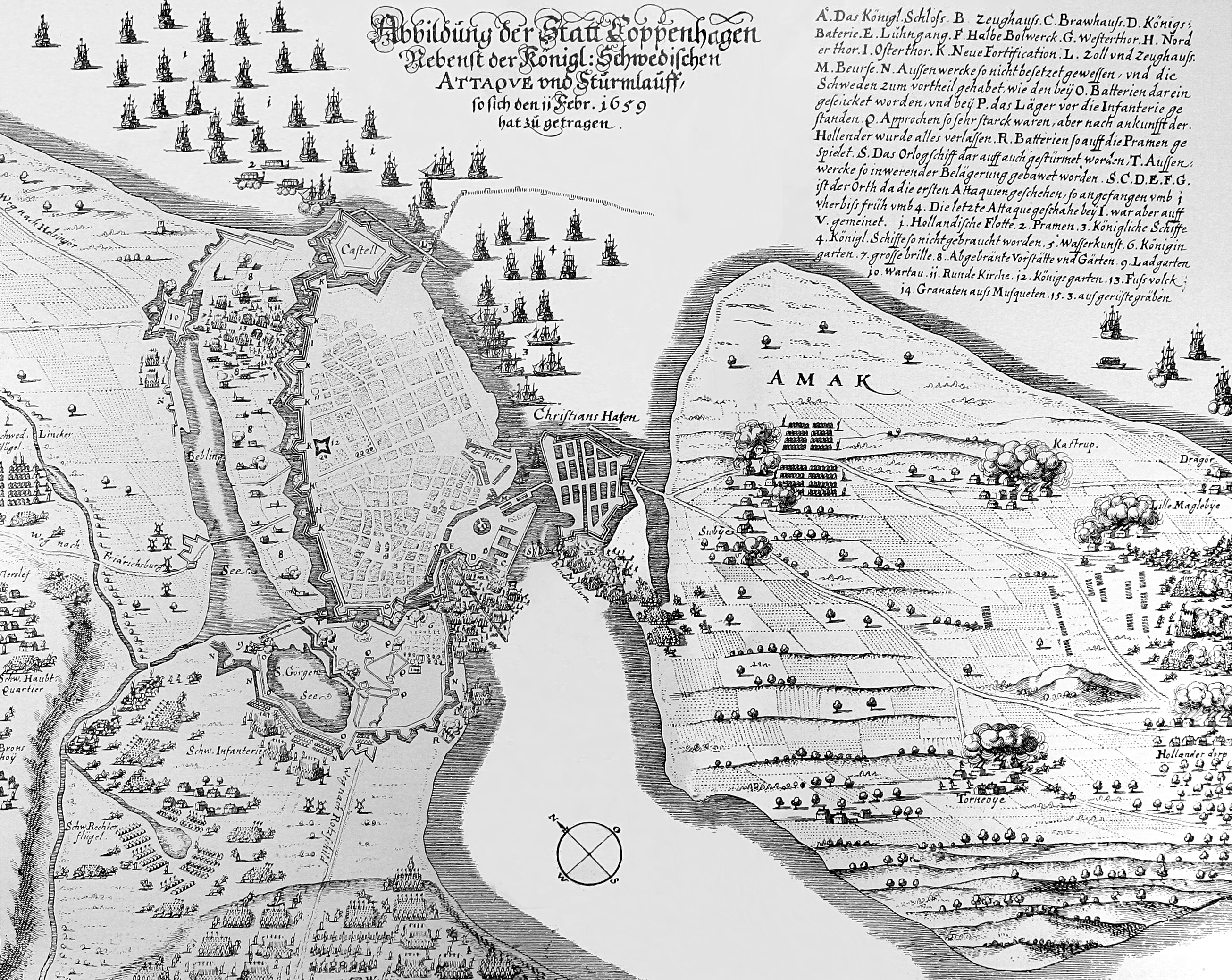|
Vitus Bering (1617–1675)
Vitus Pedersen Bering (6 October 1617 – 20 May 1675) was a Danish poet and historian. He served as Danish Historiographer Royal and was the great uncle of the explorer Vitus Bering (1681–1741). Early life and education Vitus Pedersen Bering was born in Viborg, Denmark. Bering was the son of the city mayor Peder Pedersen Bering and Maren Vitusdatter Brun. He graduated from Viborg Katedralskole in 1635. He soon attracted attention for his poems in Latin and was called to serve as steward for Otte Thott, son of Scania county governor Tage Thott (1580–1658). He subsequently conducted a seven-year foreign trip to Leiden (1639), Orléans (1640), Siena (1642), Rome and Padua (1647) and Strasbourg and Basel (1648). Career After their return to Denmark, he took a Master's degree at the University of Copenhagen in 1649. He immediately assumed a position as at the University of Copenhagen. Later that same year he was appointed to professor in history at Sorø Academy and Hist ... [...More Info...] [...Related Items...] OR: [Wikipedia] [Google] [Baidu] |
Abraham Wuchters
Abraham Wuchters (1608 – 23 May 1682) was a Brabant-born Dutch-Danish painter and engraver. He was born in Antwerp but had most of his career in Denmark where he and Karel van Mander III became the preferred painters of the Danish King, nobility and bourgeoisie. Together they represent the main influence from the Dutch Golden Age on Danish Baroque art. Biography Wuchters was born in Antwerp in 1608. In 1635 he married Christina Cornelis Nunts in Zwolle. He arrived in Denmark in 1638 and was, the following year, employed as sketching master at Sorø Academy. Around the same time, he was summoned to Copenhagen where he painted several portraits of King Christian IV. In 1645 he returned to Copenhagen Castle to portray the King's children, including ''Ulrik Christian Gyldenløve'' (c. 1645, Danish National Gallery) and ''Duke Frederik (III)'' (c. 1645, Amalienborg Palace). In two periods, between 1658 and 1662, he worked at the Royal Swedish Court in Stockholm where he portray ... [...More Info...] [...Related Items...] OR: [Wikipedia] [Google] [Baidu] |
Sorø Academy
Sorø Academy (Danish, ''Sorø Akademi'') is a boarding school and gymnasium located in the small town of Sorø, Denmark. It traces its history back to the 12th century when Bishop Absalon founded a monastery at the site, which was confiscated by the Crown after the Reformation, and ever since, on and off, it has served as an educational institution, in a variety of forms, including as a knight academy founded by Christian IV and a venue for higher learning during the Danish Golden Age. Danish writer and academian Ludvig Holberg bequested most of his fortune to re-establishing the academy in 1750 after a devastating fire. History Christian IV's equestrian academy (1623–1665) Sorø Academy traces its history back to 1140 when Archbishop Absalon founded the Cistercian Sorø Abbey in a remote woodlands setting on the shores of Lake Sorø on the island of Zealand. It developed into the most prominent and wealthy monastery in Denmark. After the Reformation in 1536, the Crown ... [...More Info...] [...Related Items...] OR: [Wikipedia] [Google] [Baidu] |
Anders Bording
Anders Christensen Bording (21 January 1619 – 24 May 1677) was a Danish poet and journalist. He was born in Ribe. He is notable for his epigrams, ballads, occasional poems and epistles, as well as for publishing the first Danish newspaper, the monthly ''Den Danske Mercurius ''Den danske Mercurius'' was a Danish newspaper, first published on 1 August 1666, by Anders Bording. He founded his versified newspaper, published in Danish with the title ''Den Danske Mercurius''. The newspaper was published on the order of t ...'', written in verse entirely by him. External links Biography of Anders Bording from the Archive of Danish Literature 1619 births People from Ribe 1677 deaths Danish male poets 17th-century Danish poets 17th-century male writers 17th-century journalists Occasional poets {{denmark-journalist-stub ... [...More Info...] [...Related Items...] OR: [Wikipedia] [Google] [Baidu] |
Occasional Song
An occasional song is a novelty song or ballad written and sung for a special occasion. Occasional songs were a cultural tradition throughout Europe and were often important in immigrant communities. In Denmark the tradition of the lejlighedssang has remained strong. Occasional songs were once customary in many European cultures, and remained traditional in immigrant communities, for example those of Jews in America. The Danish lejlighedssang remains a strong tradition, part of family celebrations, particularly during confirmation, wedding and anniversary parties. Participants write lyrics for the specific occasion composed upon a popular tune. Copies of the lyrics are written on decorative pages and distributed among the celebrants to be read and sung ''en masse''. The tradition in Denmark dates back to the street ballads and political club songs of the late 1700s. Group singing became further integrated across Danish society by the influence of N. F. S. Grundtvig Nikolaj Fre ... [...More Info...] [...Related Items...] OR: [Wikipedia] [Google] [Baidu] |
Publius Annius Florus
Three main sets of works are attributed to Florus (a Roman cognomen): ''Virgilius orator an poeta'', an Epitome of Roman History and a collection of 14 short poems (66 lines in all). As to whether these were composed by the same person, or set of people, is unclear, but the works are variously attributed to: *Publius Annius Florus, described as a Roman poet and rhetorician. *Julius Florus, described as an ancient Roman poet, orator, and author who was born around 74 AD and died around 130 AD Florus was born in Africa, but raised in Rome. *Lucius Annaeus Florus (''circa'' 74 – 130 AD), a Roman historian, who lived in the time of Trajan and Hadrian and was also born in Africa. ''Virgilius orator an poeta'' The introduction to a dialogue called ''Virgilius orator an poeta'' is extant, in which the author (whose name is given as Publius Annius Florus) states that he was born in Africa, and at an early age took part in the literary contests on the Capitol instituted by Domitian. Hav ... [...More Info...] [...Related Items...] OR: [Wikipedia] [Google] [Baidu] |
Works Attributed To Florus
Three main sets of works are attributed to Florus (a Roman cognomen): ''Virgilius orator an poeta'', an Epitome of Roman History and a collection of 14 short poems (66 lines in all). As to whether these were composed by the same person, or set of people, is unclear, but the works are variously attributed to: *Publius Annius Florus, described as a Roman poet and rhetorician. *Julius Florus, described as an ancient Roman poet, orator, and author who was born around 74 AD and died around 130 AD Florus was born in Africa, but raised in Rome. *Lucius Annaeus Florus (''circa'' 74 – 130 AD), a Roman historian, who lived in the time of Trajan and Hadrian and was also born in Africa. ''Virgilius orator an poeta'' The introduction to a dialogue called ''Virgilius orator an poeta'' is extant, in which the author (whose name is given as Publius Annius Florus) states that he was born in Africa, and at an early age took part in the literary contests on the Capitol instituted by Domitian. Hav ... [...More Info...] [...Related Items...] OR: [Wikipedia] [Google] [Baidu] |
Assault On Copenhagen (1659)
The Battle of Copenhagen also known as the Assault on Copenhagen on 11 February 1659 was a major battle during the Second Northern War, taking place during the siege of Copenhagen by the Swedish army. Background During the Northern Wars, the Swedish army under Charles X Gustav of Sweden, after invading the Danish mainland of Jutland, swiftly crossed the frozen straits and occupied most of the Danish island of Zealand, with the invasion beginning on 11 February 1658. This forced the Danes to sue for peace. A preliminary treaty, the Treaty of Taastrup, was signed on 18 February 1658, with the final treaty, the Treaty of Roskilde, signed on 26 February 1658, granting Sweden major territorial gains. The Swedish king, however, was not content with his stunning victory, and at the Privy Council held at Gottorp on 7 July Charles X Gustav resolved to wipe his inconvenient rival from the map of Europe. Without any warning, in defiance of international treaty, he ordered his troops to ... [...More Info...] [...Related Items...] OR: [Wikipedia] [Google] [Baidu] |
Christian IV Of Denmark
Christian IV (12 April 1577 – 28 February 1648) was King of Denmark and Norway and Duke of Holstein and Schleswig from 1588 until his death in 1648. His reign of 59 years, 330 days is the longest of Danish monarchs and Scandinavian monarchies. A member of the House of Oldenburg, Christian began his personal rule of Denmark in 1596 at the age of 19. He is remembered as one of the most popular, ambitious, and proactive Danish kings, having initiated many reforms and projects. Christian IV obtained for his kingdom a level of stability and wealth that was virtually unmatched elsewhere in Europe. He engaged Denmark in numerous wars, most notably the Thirty Years' War (1618–1648), which devastated much of Germany, undermined the Danish economy, and cost Denmark some of its conquered territories. He rebuilt and renamed the Norwegian capital Oslo as ''Christiania'' after himself, a name used until 1925. Early years Birth and family Christian was born at Frederiksborg Cas ... [...More Info...] [...Related Items...] OR: [Wikipedia] [Google] [Baidu] |
Diocese Of Lund
The Diocese of Lund ( sv, Lunds stift) is a diocese within the Church of Sweden which corresponds to the provinces of Blekinge and Skåne. There are 217 parishes within the diocese, the most significant number in any of the dioceses of the Church of Sweden. The present bishop of Lund, Johan Tyrberg, succeeded Antje Jackelén in 2014. The diocese was originally established in 1060 as a Roman Catholic diocese within the Kingdom of Denmark. Beginning in 1104, it had jurisdiction over ecclesiastical affairs in Denmark, Norway, and Sweden as the Archdiocese of Lund. Following the Danish Reformation, it became a diocese in the Lutheran Church of Denmark. Since the signing of the treaty of Roskilde in 1658 it has been the southernmost diocese in the Lutheran Church of Sweden. History Catholic diocese The Roman Catholic Diocese of Lund was formed in 1060, in what was then Danish territory, by separation from the Diocese of Roskilde, then both suffragans of the German Archdiocese o ... [...More Info...] [...Related Items...] OR: [Wikipedia] [Google] [Baidu] |
Peder Winstrup
Peder Pedersen Winstrup (30 April 1605 – 28 December 1679) was Bishop of Lund in Scania. Winstrup was bishop there during a period spanning both Danish and Swedish sovereignty and periods of war when the land was contested. He was married to the Danish noblewoman, Dorothea von Andersen who was an influential person in her own right in Scania and known to be strongly pro-Danish. Early life and education Winstrup was born in Copenhagen, then the capital of Denmark–Norway, on 30 April 1605. He was the son of Peder Jensen Vinstrup, Bishop of Zealand and professor of theology at the University of Copenhagen. After his father's death in 1614, his mother married his successor as bishop. Peder Winstrup the younger studied at the universities of Rostock, Wittenberg, Leipzig, and Jena in Germany and graduated from the University of Copenhagen in 1633. In 1635, he was appointed royal chaplain in the household of King Christian IV. He was awarded a doctorate in theology in 1636 and was ... [...More Info...] [...Related Items...] OR: [Wikipedia] [Google] [Baidu] |
Charles XI Of Sweden
Charles XI or Carl ( sv, Karl XI; ) was King of Sweden from 1660 until his death, in a period of Swedish history known as the Swedish Empire (1611–1721). He was the only son of King Charles X Gustav of Sweden and Hedwig Eleonora of Holstein-Gottorp. His father died when he was four years old, so Charles was educated by his governors until his coronation at the age of seventeen. Soon afterward, he was forced out on military expeditions to secure the recently acquired dominions from Danish troops in the Scanian War. Having successfully fought off the Danes, he returned to Stockholm and engaged in correcting the country's neglected political, financial, and economic situation. He managed to sustain peace during the remaining 20 years of his reign. Changes in finance, commerce, national maritime and land armaments, judicial procedure, church government, and education emerged during this period. Charles XI was succeeded by his only son Charles XII, who made use of the well-tra ... [...More Info...] [...Related Items...] OR: [Wikipedia] [Google] [Baidu] |
Corfitz Ulfeldt
Count Corfits Ulfeldt (10 July 1606 – 20 February 1664) was a Denmark, Danish politician, statesman, and one of the most notorious traitors in Danish history. Early life Ulfeldt was the son of the chancellor Jacob Ulfeldt (1567–1630), Jacob Ulfeldt. He was educated abroad, concluding with one year under Cesare Cremonini (philosopher), Cesare Cremonini at Padua. He returned to Denmark in 1629. Rise to power Upon his return to Denmark, Ulfeldt quickly won the favor of Christian IV of Denmark, King Christian IV. In 1634 he was made a Knight of the Order of the Elephant, in 1636 became Councillor of State, in 1637 Governor of Copenhagen, and in 1643 Danish Stewards of the Realm, Steward of the Realm. In 1637 Ulfeldt married Leonora Christina Ulfeldt, Leonora Christina (1621–1698) who was the daughter of King Christian IV of Denmark. She had been betrothed to him since her ninth year. Ulfeldt was the most striking personality at the Danish court in all superficial accom ... [...More Info...] [...Related Items...] OR: [Wikipedia] [Google] [Baidu] |







_en2.png)
